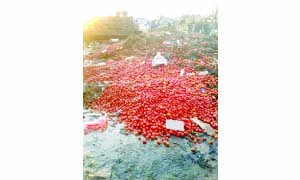By CHRISTINE KUNDA –
THE recent announcement by Government to set up value addition based industries is good news that has the potential to add to economic growth and help turn around Zambia’s ailing economy.
Commerce, Trade and Industry Minister Chipoka Mulenga recently said value addition based industries will be established seeing that for a number of years, Zambia has been exporting raw materials ranging from logs to cereals, a trend that has continued to disadvantage the country.
Mr Mulenga was speaking in the United Arab Emirates (UAE) at a business forum that attracted various investors from around the world.
The forum, which was part of the on-going World Expo 2020, was held under the sub-theme: “Doing business in Zambia.”
“Government wants to partner investors that can set up base in the country and add value to products before exporting them,’ he said.
Experts say when farmers and entrepreneurs turn raw agricultural produce like vegetables or cereals into a product of higher value, like jam or bread, they not only improve their income, but also contribute to community and rural economic development, besides enhancing food choices for consumers.
Value addition provides competitive opportunities because it creates value-added producer-owned businesses.
Lack of industries to enhance value addition for some agricultural produce like tomatoes, mangoes, pineapple, groundnuts and a host of other types of agriculture produce which is in abundance goes to waste because there is no value addition.
For instance, a lot of tomatoes and mangoes worth thousands of Kwacha goes to waste at Lusaka’s Soweto Market due to lack of value addition industries which could have produced tomato paste and mango juice that can earn added revenue for producers.
But owing to lack of such industries, coupled with poor storage, these products are discarded and allowed to rot when they are produced at great cost.
Moreover, over the years, it has been observed that the mango fruit, which is widely produced in Zambia, only goes to waste every mango season.
Tones of mangoes litter the ground and decay due to lack of capacity for procession.
It is for this reason that the Food and Agriculture Organisation (FAO) is working on creating programmes like the Incentivizing Public and Private Sector Investments Project (IPPIP) in Zambia.
The project seeks to identify the value chain that could be most suitable for upgrading, with the objective of indentifying end-market opportunities and innovation potential, creating youth employment and minimizing food losses and waste.
FAO Country Representative Anne Percy Filippini said if farmers get to add value to their produce through processing, there will be an increase in income and a reduction in financial stress, which would lead to the revitalisation of rural communities.
Ms Filippini said FAO is working with the Government to devise ways of encouraging the private sector to invest more in Zambia’s agriculture sector.
She said full value chain for agriculture produce in the country should be at the top of the agenda for various stakeholders.
Ms Filippini noted that value chain selection is a very important first step in value chain development for raw agricultural produce.
This is an important initial step because it identifies the value chain that is most suitable for upgrading to avoid food loss.
She said some of the value chains that are indentified include aquaculture, diary, maize, onion, pineapple, potatoes, soya beans, sunflower and wheat.
“Understanding agricultural value chain is vital in order to indentify key constraints and opportunities for upgrading to avoid food loss and reduce waste,” she said.
The IPPIP falls under a four-year intervention being implemented at a cost of US$2 million.
The “Sustainable, Resilient and Inclusive Food Systems Development” is being implemented by FAO in 13 different countries around the world.
Zambia happens to be one of the five African countries that will benefit from the programme.
Private Sector Development Programme (PSDP) Chairperson Yusuf Dodia said agriculture plays a critical role in a country’s economy.
He said agriculture is important to an economic system.
Mr Dodia said in addition to providing food and raw materials, agriculture creates job opportunities to a very large percentage of the population.
“The move to boost agriculture investment and production through value addition industries is the right goal for a growing agriculture sector that will contribute to the country’s economy,” he said.
Zambia’s 2022 National Budget highlights the need to expand production in various sectors, and the focus would be to increase output in the sector.
Addressing Parliament during the 2022 Budget presentation, Finance and National Planning Minister Situmbeko Musokotwane said economic transformation would entail shifting resources to activities of higher productivity there-by growing the economy and creating job opportunities for the citizens.
“Agriculture presents the best opportunities to attain growth, especially that the majority of our people, about 60 per cent, are dependent on it. We can do more in agriculture by promoting large scale estate production for both domestic and export markets,” he said.
Dr Musokotwane said the agriculture sector has a relatively short gestation period, with low capital requirements, readily available labour, abundant water resources and availability of arable land.
It is undeniable that the agricultural sector remains important to Zambia’s economy, contributing about 19 per cent to the country’s Gross Domestic Product (GDP).
Developing agriculture production and investment offers a progressive outlook and presents increased motivation for national development.
Therefore, investing in value addition industries in the agriculture sector would help to create additional impetus for economic growth.







